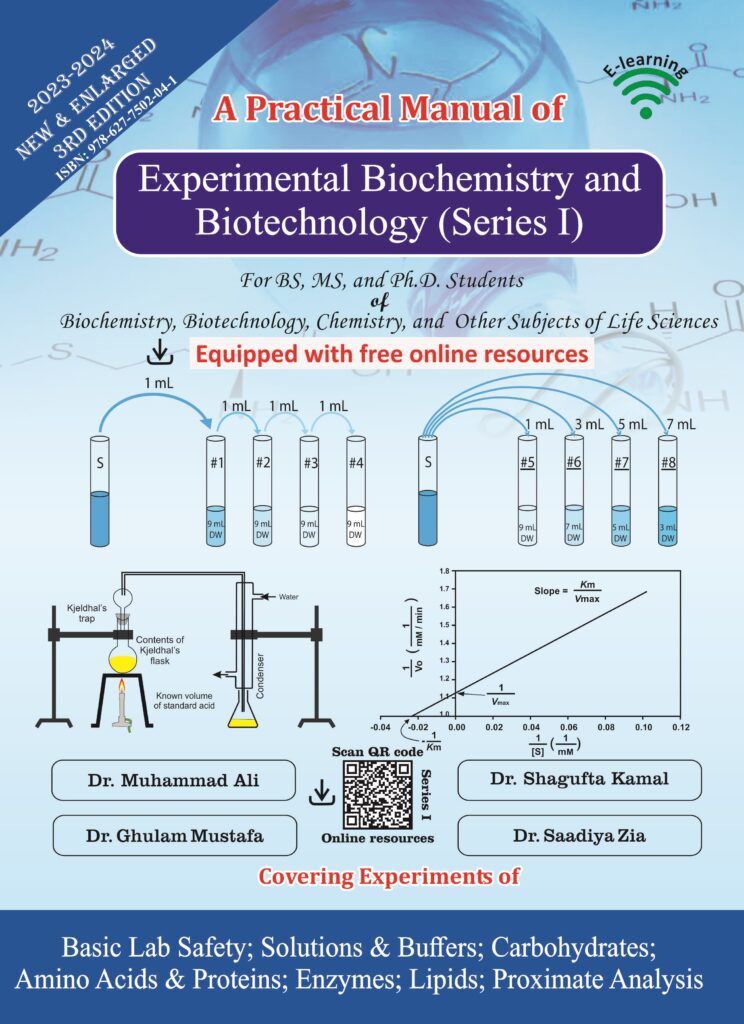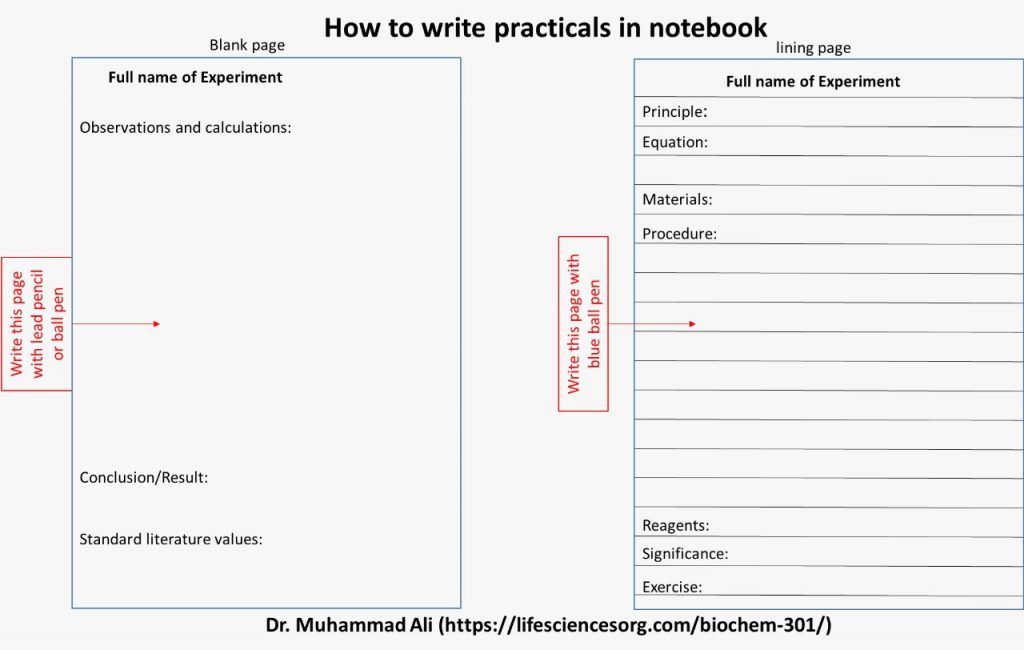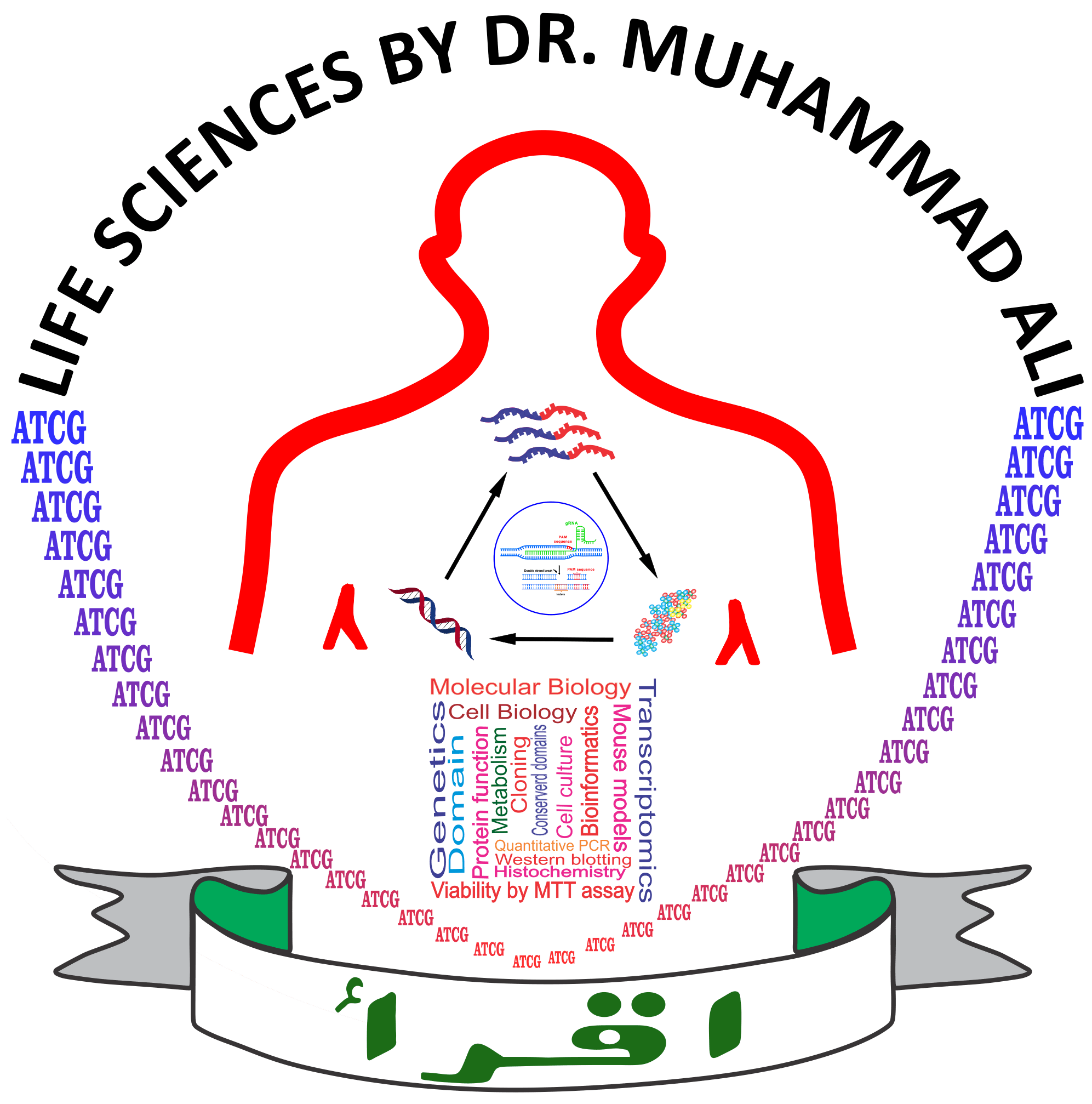Biochem-705 (List of Practical) 3(1-2)
- TLC of amino acids/sugars/ natural products;
- Gel filtration/Ion exchange chromatography of proteins;
- Gas Chromatography/GC-MS of fatty acids or volatile/aromatic compounds;
- HPLC/LCMS analysis of compounds; PAGE of proteins; Analysis of
- metals in plant/ biological fluids by AAS/LIBS;
- Chemical fingerprint of samples by FTIR;
- ELISA for disease diagnosis
Ali, M. et al., Experimental Biochemistry and Biotechnology (Series III), 2023, 3rd edition, ISBN: 978-627-7502-06-5.
- Mid-term syllabus of Biochem-705: Global Operating Procedures (GOP); Quality controls and quality assurance; Validations of analytical methods; Advanced Chromatographic techniques, modern (HPLC, GC, FPLC) and hyphenated or conjugated (GC-MS, LC-MS) techniques; MALDI-tof,
…. PLUS…. First 150 MCQs from each of chapters 2, 3 of the book ” MCQs in Biochemistry”. MCQs from the taught concepts and book chapters will also appear in the exam.
Final exam Biochem-705:
gel electrophoresis. Biosensors, Ultrafiltration and lyophilization. Immunoassays: RIA, ELISA, fluoroimmunoassay, chemiluminescence immunoassay; microarrays; IR spectrometry; Atomic absorption spectrophotometry; NMR, MRI; Electron Microscopy; Bioanalytical approaches for diagnostics and research.
…. PLUS…. First 150 MCQs from chapters 2,3,4 of the book ” MCQs in Biochemistry”. MCQs from the taught concepts and book chapters will also appear in the exam.
Start preparing your presentations and assignments….. Assignment submission right after mid-exam. The presentations will also be started after mid-term exam.
__________________________________________________________________________________
Assignments and presentations of Biochem-512:
- The weightage of the assignment and presentation will be decided later.
- Start preparing your presentations and assignments….. Assignment submission is 18-04-2023.
- The presentations will also be started right after the mid-term exam.
- PPT file should not contain any designing/colours other than figures and diagrams.
- Slides should be in 16X9 ratio.
- Fonts of all header should be same and of all other text should be same.
- For detailed guidelines about the presentation of research article, visit: https://www.lifesciencesorg.combiochem-720/
- Download the template ppt file to make your presentation. The link is here (copy this link and paste in a new tab).
- Strictly follow the ppt format and it is better if you write and paste your material in the same ppt file.
K. General Question to be asked during presentation
- 1) Pathway or importance of gene/technology/discovery
- 2) Rationale
- 3) Conclusion of the full article
- 4) Conclusion of every figure
- 5) New findings presented in the article
- 6) Applications of the findings
- 7) Future prospective
- 8) Applications of the work
- 9) Principle of every technique used in the research article
Moreover, provide me a printed summary of your article containing the above headings given under ‘K’.
L. During Presentations, for EVERY FIGURE and graph, we may ask:
1. The Principle of the experiment.
2. The Reason for doing the experiment.
3. The Physiological importance of the figure.
4. The Conclusions of the figure
5. Prepare well objectively and subjectively
NO EXCUSE WILL BE ACCEPTED
_______________________________________________________________
Link to download the book ( MCQs in Biochemistry) is here.
Meeting ID: 316 824 288 013
Passcode: WNyjeA
Microsoft teams will be used whenever online classes will be held. You must make your first name as your registration number.
2017-ag-9382 Haidar Iftikhar
2017-ag-10077 Ahmad Faraz 75
BIOCHEM-705 ADVANCED BIOCHEMICAL TECHNIQUES 3(1 -2)
Course Learning Outcomes
By the end of this course students will be able to;
- Learn advancement in the separation sciences
- Get the advanced knowledge of different bioanalytical techniques
- Demonstrate practical knowledge regarding advanced techniques applied in life sciences
- Understand the practical approaches of different advanced bioanalytical tools
Theory
Global
Operating Procedures (GOP); Quality controls and quality assurance; Validations
of analytical methods; Advanced Chromatographic techniques, modern (HPLC, GC,
FPLC) and hyphenated or conjugated (GC-MS, LC-MS) techniques; MALDI-tof, gel
electrophoresis. Biosensors, Ultrafiltration and lyophilization. Immunoassays:
RIA, ELISA, fluoroimmunoassay, chemiluminescence immunoassay; microarrays; IR
spectrometry; Atomic absorption spectrophotometry; NMR, MRI; Electron
Microscopy; Bioanalytical approaches for diagnostics and research.
Practical
TLC of amino
acids/sugars/ natural products; Gel filtration/Ion exchange chromatography of
proteins; Gas Chromatography/GC-MS of fatty acids or volatile/aromatic
compounds; HPLC/LCMS analysis of compounds; PAGE of proteins; Analysis of
metals in plant/ biological fluids by AAS/LIBS; Chemical fingerprint of samples
by FTIR; ELISA for disease diagnosis
Suggested Readings
- 1. Boyer, R. 2012. Modern Experimental Biochemistry. 4th Ed. (LPE). Pearson Education, New Delhi, India.
- 2. Gault, V.A. and N. H. McClenaghan. 2013. Understanding Bioanalytical Chemistry: Principles and Applications. 2nd Ed. Wiley-Blackwell, Ireland, UK.
- 3. Gowenlock, A. H., J.R. McMurray and D.M. McLauchlan. 2006. Varley’s Practical Clinical Biochemistry. 6th Ed. CBS Publishers and Distributors, New Delhi, India.
- 4. Joseph B.L., E.P. Mazzola. 2019. Nuclear Magnetic Resonance Spectroscopy Introduction to Principles, Applications, and Experimental Methods. 2nd Ed. John Weley and Sons, Hoboken, USA.
- 5. Sawhney, S.K. and R. Singh. 2014. Introductory Practical Biochemistry. 5th Ed. Narosa Publishing House, New Delhi, India.
- 6. Wilson, K. and J. Walker. 2018. Practical Biochemistry: Principles and Techniques. 8th Ed. Cambridge University Press, New Jersey, USA.
- Ali, M. et al., Experimental Biochemistry and Biotechnology (Series I), 2023, 3rd edition, ISBN: 978-969-7502-04-1.
- Ali, M. et al., Experimental Biochemistry and Biotechnology (Series II), 2023. 2nd edition, ISBN: 978-969-7502-05-8.
- Ali, M. et al., Experimental Biochemistry and Biotechnology (Series III), 2024, 1st edition, ISBN: 978-969-7502-06-5.


Lorem ipsum dolor sit amet, consectetur adipiscing elit. Ut elit tellus, luctus nec ullamcorper mattis, pulvinar dapibus leo.


Comments are closed.